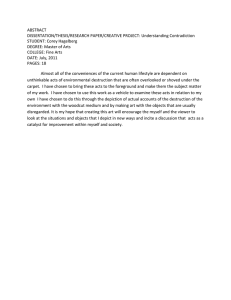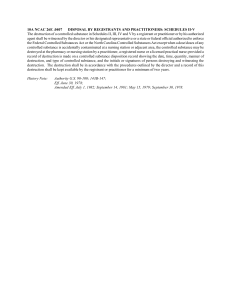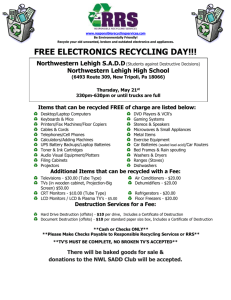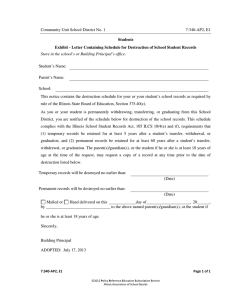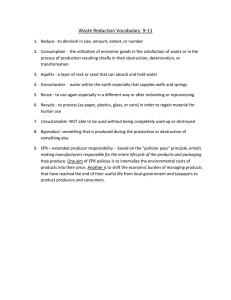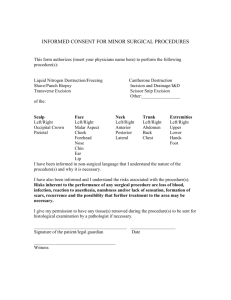CRYPTOSECURITY CHAPTER 4
advertisement
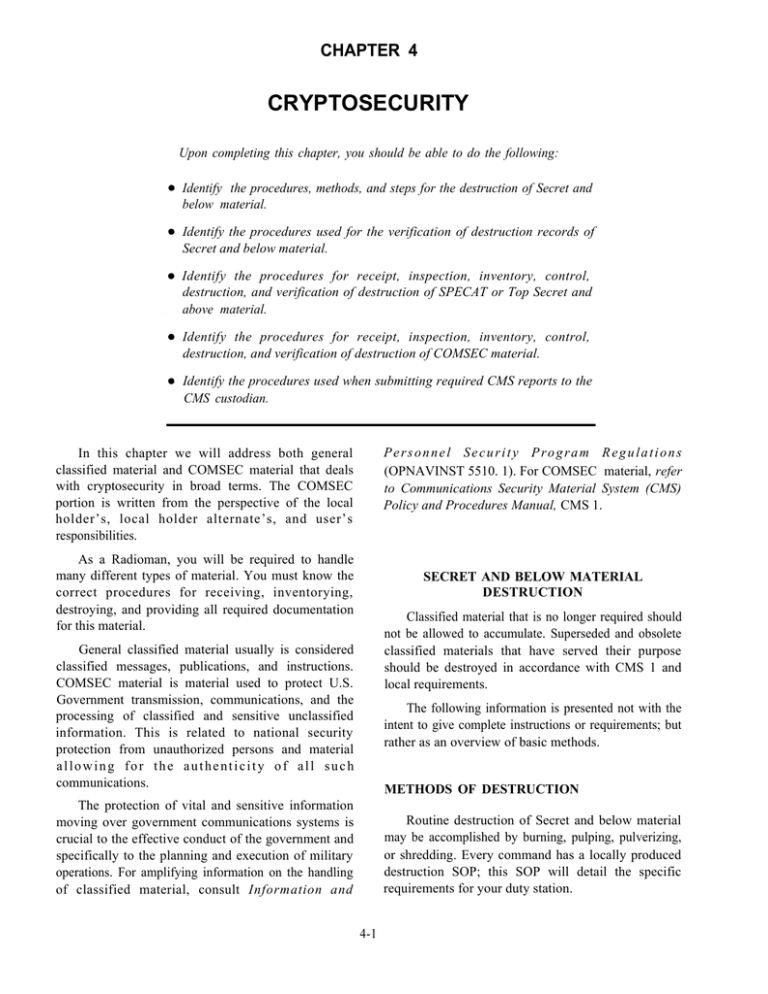
CHAPTER 4 CRYPTOSECURITY Upon completing this chapter, you should be able to do the following: Identify the procedures, methods, and steps for the destruction of Secret and below material. Identify the procedures used for the verification of destruction records of Secret and below material. Identify the procedures for receipt, inspection, inventory, control, destruction, and verification of destruction of SPECAT or Top Secret and above material. Identify the procedures for receipt, inspection, inventory, control, destruction, and verification of destruction of COMSEC material. Identify the procedures used when submitting required CMS reports to the CMS custodian. Personnel Security Program Regulations (OPNAVINST 5510. 1). For COMSEC material, refer to Communications Security Material System (CMS) Policy and Procedures Manual, CMS 1. In this chapter we will address both general classified material and COMSEC material that deals with cryptosecurity in broad terms. The COMSEC portion is written from the perspective of the local holder’s, local holder alternate’s, and user’s responsibilities. As a Radioman, you will be required to handle many different types of material. You must know the correct procedures for receiving, inventorying, destroying, and providing all required documentation for this material. SECRET AND BELOW MATERIAL DESTRUCTION Classified material that is no longer required should not be allowed to accumulate. Superseded and obsolete classified materials that have served their purpose should be destroyed in accordance with CMS 1 and local requirements. General classified material usually is considered classified messages, publications, and instructions. COMSEC material is material used to protect U.S. Government transmission, communications, and the processing of classified and sensitive unclassified information. This is related to national security protection from unauthorized persons and material allowing for the authenticity of all such communications. The following information is presented not with the intent to give complete instructions or requirements; but rather as an overview of basic methods. METHODS OF DESTRUCTION The protection of vital and sensitive information moving over government communications systems is crucial to the effective conduct of the government and specifically to the planning and execution of military operations. For amplifying information on the handling of classified material, consult Information and Routine destruction of Secret and below material may be accomplished by burning, pulping, pulverizing, or shredding. Every command has a locally produced destruction SOP; this SOP will detail the specific requirements for your duty station. 4-1 DESTRUCTION INVENTORY Secret material will be destroyed following the twoperson rule without a record of destruction. If only one person destroys Secret material, a record of destruction must be made. Material will be logged in the Top Secret log and placed in the appropriate safe. When destroying Confidential material, personnel must have a clearance level equal to or greater than the material. No record of destruction is required. Access to SPECAT, Top Secret, or above material will be closely guarded on a need-to-know basis. All material must be accounted for by signature. CONTROL The commanding officer may impose additional controls at his or her discretion. DESTROY Top Secret material will be destroyed by two witnessing officials. Those performing the destruction must have a clearance level equal to or greater than the material being destroyed. COMPLETE DESTRUCTION REPORTS Destruction reports will be made in accordance with OPNAVINST 5510.1 and local instructions. Destruction of SPECAT and Top Secret and above material was covered in depth in module 1. VERIFY DESTRUCTION RECORDS VERIFY DESTRUCTION To verify destruction records, the senior person will ensure that the material has been completely destroyed and only residue remains. All blanks are filled in correctly on the destruction report (if one is required), and it is turned into the proper authority. For information and procedures relating to verifying the destruction of SPECAT and Top Secretor above material, refer to OPNAVINST 5510.1 and local instructions. COMSEC MATERLAL SPECAT OR TOP SECRET AND ABOVE MATERIALS Communications security (COMSEC) is a framework that allows the NAVY a unique distribution system that takes into account strict accountability and control procedures. The requirements for this system are exacting to ensure proper use of the cryptosystems in all areas. Classified material that is of a more sensitive nature requires more “eyes-on” and “paper-trail” procedures. These materials must be provided control and accounting that relates to their assigned classification. This will limit the dissemination, reproduction, and viewing by personnel who, in the course of their duties, require access. RECEIVE SPECAT or Top Secret will normally be handled at the E-6 and above level. If receipt of this material is a recurring event at the command, follow the guidelines in OPNAVINST 5510.1, and local instructions. To receive material into local custody is to accept the responsibility for the proper handling, safeguarding, accounting, and disposition of COMSEC material issued by the custodian and user personnel. Every person who receives COMSEC material must complete a CMS Responsibility Acknowledgement Form, which is located in Annex K of CMS 1. This signed form must be on file with the CMS Custodian. INSPECT INSPECT Upon receipt of SPECAT, TOP Secret, or above material, ensure that all receipts and material are identified and verified prior to acceptance of the material. Local holders (LHs) will inspect the material that is issued for their use. They should verify that all material listed on the SF-153 is physically accounted for, check that all short titles and accounting numbers match, and RECEIVE 4-2 have any questions for use or storage answered prior to acceptance of the material. VERIFY DESTRUCTION Refer to CMS 1 and local instructions for procedures to verify destruction of all COMSEC materials. INVENTORY LH custodians must main a local custody file containing effective signed local custody documents. These will list all material in their possession. A watch station must maintain a watch-to-watch inventory that lists all COMSEC material held. This material is to be listed by short title, edition, accounting numbers, and quantity. REQUIRED CMS REPORTS SUBMITTED TO CMS CUSTODIAN CMS reports to the CMS Custodian normally include destruction reports and SF-153’s that contain material that is to be returned to the CMS Custodian. CONTROL Further information on reports that the CMS Custodian may require are found in detail in CMS 1 and its various annexes. Watch-to-watch inventory is used to maintain control of effective material and material to be used in the future. Effective and supersession dates for all COMSEC material (less equipment and related components and devices) that the watch holds must have clearly marked dates in accordance with Article 760 of CMS 1. SUMMARY Security precautions will protect the integrity of the systems that are in place as long as you, as the radioman, understand and carry out the correct methods for handling, inventorying and destruction of required classified or COMSEC material. Security considerations presented in this chapter will not guarantee protection, nor do that try to cover all required areas. You will have to research and familiarize yourself with all requirements at the command or area that you are working in. DESTROY Destruction of superseded material must be accurately documented and conducted within the required time frame. Article 790 of CMS 1 contains destruction procedures, and chapter 5 delineates personnel, methods, and time periods for destroying COMSEC material. 4-3
